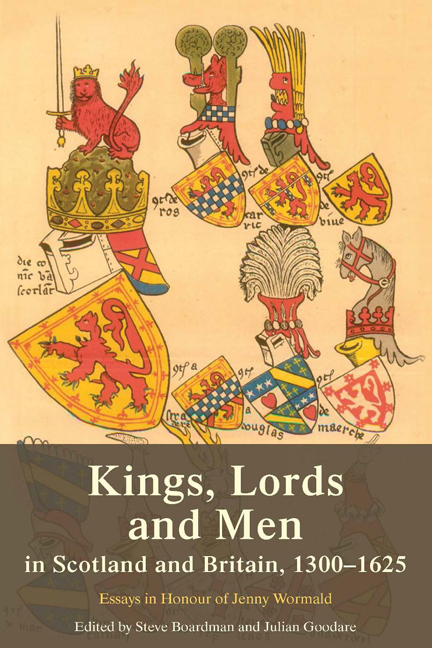Book contents
- Frontmatter
- Contents
- List of Illustrations
- Preface
- List of Abbreviations
- List of Contributors
- Introduction: Kings, Lords and Jenny Wormald
- 1 The Stewart Realm: Changing the Landscape
- Part I Lords and Men
- 2 Lords and Women, Women as Lords: The Career of Margaret Stewart, Countess of Angus and Mar, c.1354–c.1418
- 3 Bastard Feudalism in England in the Fourteenth Century
- 4 Tame Magnates? The Justiciars of Later Medieval Scotland
- 5 King, Lords and Men in Renaissance England: The Poetry of John Skelton
- 6 Rethinking the Justice of the Feud in Sixteenth-Century Scotland
- 7 Bonding, Religious Allegiance and Covenanting
- 8 ‘We Bund and Obleiss Us Never More to Querrell’: Bonds, Private Obligations and Public Justice in the Reign of James VI
- Part II Kings and Lords
- Publications of Jenny Wormald
- Index
2 - Lords and Women, Women as Lords: The Career of Margaret Stewart, Countess of Angus and Mar, c.1354–c.1418
from Part I - Lords and Men
Published online by Cambridge University Press: 15 December 2017
- Frontmatter
- Contents
- List of Illustrations
- Preface
- List of Abbreviations
- List of Contributors
- Introduction: Kings, Lords and Jenny Wormald
- 1 The Stewart Realm: Changing the Landscape
- Part I Lords and Men
- 2 Lords and Women, Women as Lords: The Career of Margaret Stewart, Countess of Angus and Mar, c.1354–c.1418
- 3 Bastard Feudalism in England in the Fourteenth Century
- 4 Tame Magnates? The Justiciars of Later Medieval Scotland
- 5 King, Lords and Men in Renaissance England: The Poetry of John Skelton
- 6 Rethinking the Justice of the Feud in Sixteenth-Century Scotland
- 7 Bonding, Religious Allegiance and Covenanting
- 8 ‘We Bund and Obleiss Us Never More to Querrell’: Bonds, Private Obligations and Public Justice in the Reign of James VI
- Part II Kings and Lords
- Publications of Jenny Wormald
- Index
Summary
The significance of patrilineal descent, and the concomitant ties of blood and surname, for the way in which late medieval Scottish aristocrats thought about and articulated their identity and place in society has been much discussed in recent scholarship, most notably in two brilliant studies by Jenny Wormald published in the 1980s. One of the most important conclusions arising from Wormald's wide-ranging analysis was that the obligations of kinship, feud, lordship and service, far from acting to disrupt and destabilise local society (as older interpretations assumed), were vital to the successful operation of justice and the maintenance of social order and governmental authority. In evaluating the relative strength of the ties that bound aristocratic society together, Wormald broadly accepted the evidence for the primacy of links between male kinsmen, and the fundamental importance of the sense of belonging to, and being obliged to defend and promote the interests of, an agnatic kin-group. The bonds established through marriage and the obligations to marital and maternal kinsmen were seen, in comparison, as essentially fragile and ephemeral.
Examples of noblemen expressing commitment to the welfare and prosperity of their male lineage are certainly not hard to find in late medieval Scotland. One document type where these sentiments could be invoked with particular clarity was the charter of tailzie (entail), by which landowners sought to regulate the descent of property rights to the advantage of family members who might not otherwise have had strong claims on part or all of a lord's estates after his death. The entailing of property to male relatives (typically brothers, uncles or cousins and their male heirs) at the expense of heirs general was an intermittent practice in fourteenth- and fifteenth-century Scotland, although a full assessment of the scale and frequency of this type of arrangement is still required. The concern to avoid female inheritance could sometimes be articulated with startling vehemence, as in James Douglas of Dalkeith's 1369 entailing of his barony and castle of Dalkeith, which limited the descent of the properties ‘always to heirs male of the said James having the surname [cognomen] Douglas’, with descent to a female heiress only countenanced if ‘all heirs male of the for said surname of Douglas’ had ‘wholly failed’.
- Type
- Chapter
- Information
- Kings, Lords and Men in Scotland and Britain, 1300-1625Essays in Honour of Jenny Wormald, pp. 37 - 58Publisher: Edinburgh University PressPrint publication year: 2014



